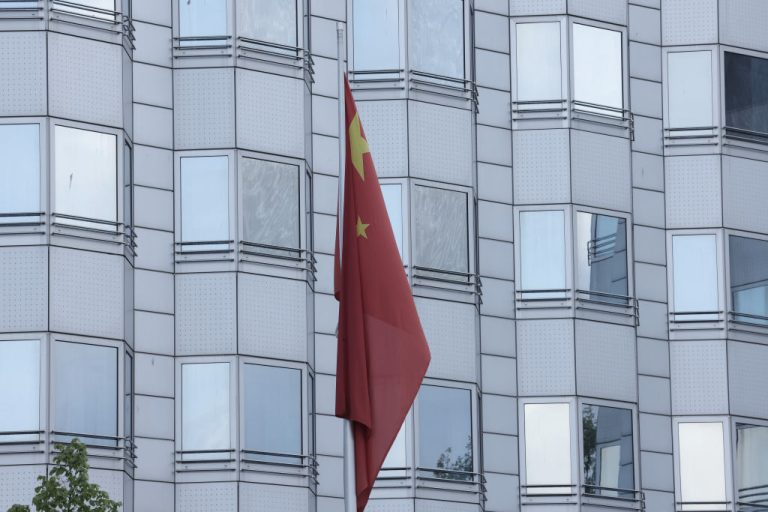Governor of Florida Ron DeSantis has signed into law a trio of bills designed to counteract the Chinese Communist Party’s influence in the Sunshine State.
Announced on May 8, a press release on the Governor’s website is complete with an infographic titled “Stop CCP Influence” summarizing bills SB 264, 846, and 258.
The Governor states that the package of legislation will prevent “Chinese entities or affiliates” from purchasing Florida farmland or land near military bases and other critical infrastructure.
Additionally, “sensitive data” is now prevented from being stored on Internet servers that “might be owned by entities affiliated with the CCP,” while a statewide ban on TikTok and other “dangerous applications” on government and educational institution devices has been enacted.
MORE ON FLORIDA’S STANCE AGAINST THE CCP
- Florida Takes Aim at Marxism-Leninism as DeSantis Signs Victims of Communism Day Bill
- ‘A Big Failure for the United States’: Florida’s DeSantis on Investing in China
- Ron DeSantis Outlaws Vaccine Passports With Executive Order
The bills also prohibit “Chinese influence” DeSantis states his administration had “rooted out of higher education” from trickling down into the secondary and primary education levels.
Success
You are now signed up for our newsletter
Success
Check your email to complete sign up
Two years ago, the governor had started an initiative to “combat corporate espionage and higher education subterfuge carried out by the CCP and its agents.”
“Chinese spies” are also directly referenced as a target group his administration wishes to protect Florida state data from.
DeSantis was quoted in the release as stating that “Florida is taking action to stand against the United States’ greatest geopolitical threat — the Chinese Communist Party.”
“We are following through on our commitment to crack down on Communist China,” he added.
Spinning labels
However, establishment media outlets widely labelled the initiative with “anti-China” xenophobic overtones, downplaying the legislation’s focus on the communist regime.
An article by The Hill titled “DeSantis Signs Bill That Bans Chinese Citizens From Buying Land In Florida” reads:
“SB 264, referred to as Interests of Foreign Countries, will prohibit ‘governmental entities from contracting with foreign countries and entities of concern and restricts conveyances of agricultural lands and other interests in real property to foreign principals,’ which include the People’s Republic of China and other entities and individuals affiliated with the country.”
A nearly identically-titled article published by Fox13 Tampa Bay likewise stripped almost all the bills’ references to the Communist Party from the narrative, implying that the legislation is simply cracking down on “China.”
It stated, “The measures will restrict land ownership in Florida by Chinese citizens, ban the use of Chinese-owned social media platforms such as TikTok and WeChat on government devices and further limit colleges and universities from building relationships with foreign ‘countries of concern’ such as China.”
The Orlando Sentinel framed the issue as one where “other measures restrict land ownership in Florida by Chinese citizens and further limit colleges and universities from building relationships with foreign ‘countries of concern’ such as China.”
A September 2022 press release on the Governor of Florida website lists seven “countries of concern,” including the PRC, Cuba, Russia, Iran, North Korea, Syria, and Venezuela.
These countries are also included in the text of the legislation DeSantis signed on May 8.
Fox13 at least quoted DeSantis as stating to reporters that the trio of bills “makes it very clear we don’t want the CCP (the Chinese Communist Party) in the Sunshine State.”
USA Today affiliate Tallahassee Democrat published a piece on the bills from the angle that “many Florida Chinese groups [are] worried it will lead to discrimination.”
The Democrat wrote that “a coalition of Florida Chinese groups caught wind of measure. At the bill’s last House committee stop, more than 100 people signed up to testify in opposition,” stating that many “worry the language is too broad and will lead to discrimination.”
“They worry property sellers will be hesitant to consider the Chinese community — or any other Asian community — over fears they’ll be breaking the law. And they say the legislation conflates Chinese people with the Chinese government and the CCP,” author Douglas Soule added.
The actual text of the 29-page SB264, however, unambiguously targets the CCP regime in mainland China, rather than the Chinese people.
The legislation summarizes that it is “prohibiting the People’s Republic of China, the Chinese Communist Party, any other political party or member of a political party in the People’s Republic of China, and certain persons and entities from purchasing or acquiring real property in this state or having more than a de minimus indirect interest in such real property.”
Commercial and agricultural protections
Additional prohibitions on State of Florida contracts and commercial and personal agricultural land purchases in the bill extend to all seven nations on the concern list.
Much of the restrictions revolve around the definition of a “foreign principal,” primarily defined as including any member of government or member of a political party in any of the seven countries of concern, or an individual who is “domiciled in a foreign country of concern and is not a citizen or lawful permanent resident of the United States.”
However, those who the foreign principal designation applies to may still purchase up to two acres of land if the land is 5 miles away from a military installation and so long as they hold a United States Visa that is neither a tourism or asylum Visa.
The distance restriction is increased to 10 miles if the purchaser intends to sell within three years of purchase.
While a May 4 article by the Tampa Bay Times claimed that “only Chinese citizens would be prohibited from owning land — or homes — anywhere in the state,” the text of the legislation says otherwise.
SB 264 carries a section specifically addressing The People’s Republic of China. However, the section only bars nationalized entities, members of the CCP, members of other political parties in mainland China, or any businesses operating out of the mainland, from purchasing property.
The only reference to ordinary citizens in the section states: “Any person who is domiciled in the People’s Republic of China and who is not a citizen or lawful permanent resident of the United States” is prohibited from acquiring land.
The Times’ article noted that State Rep. Katherine Waldron, the Democrat Party’s co-sponsor of the bill, alleged that the “coalition of Florida Chinese groups” referenced in the Democrat’s article were actually bussed in from Texas.
The article paraphrased Waldron and state Rep. David Borrero, a Republican, as adding “they know of Chinese Americans who have been threatened from speaking in favor of the bill and silenced on WeChat, the dominant phone app in China.”
Waldron told supportive Chinese-Americans to “not be intimidated by the vocal and aggressive actors we’ve seen in the past few weeks, who do not have our country’s best interests in mind … The communist threat to our nation is real.”
An article published by South China Morning Post from the Tribune News Service stated that “nearly all of the speakers listed a Florida address, and many were easily verifiable through land-purchase records.”
The article was objective compared to those published by American media when it admitted, “Anyone, including from China, could buy one property up to 2 acres if it is not within 8km (5 miles) of a military base and the land is in the name of someone with a non-tourist visa.”







